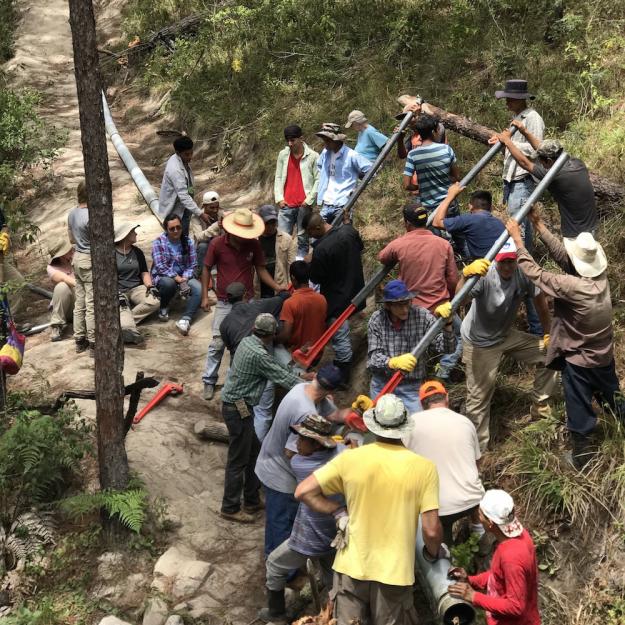
Sister Water Project volunteers install pipes to complete a 19-mile water project in the Honduran village of Mejocote, August 2018. (Courtesy of the Sisters of St. Francis of Dubuque, Iowa)
Many people take water for granted, but it is a resource essential to all life – humans, animals and plants.
- On your own or working with a friend, develop a list of at least a dozen ways in which water can be used to improve the lives of people or creatures?
- Likewise, develop a list of the sources from which you get water every day.
- The United Nations has prioritized clean water among its 17 sustainable development goals. Discover more about the need for clean water around the world here.
Water shortages and crises can happen anywhere, for most any reason. Natural disasters, for example, can disrupt the water supply of the most sophisticated cities. Human activity and negligence also contribute to water contamination, as seen in Flint, Michigan, and in villages in developing nations around the world. As you discover the problems and solutions described in this article, think about the last time you were really thirsty and imagine how you'd feel if there was no quick fix to that problem.
Meeting people's need for clean water changes sisters' lives, too
by Dan Stockman
Praised be You my Lord through Sister Water,
So useful, humble, precious and pure
—St. Francis of Assisi, "Canticle of Brother Sun and Sister Moon"
For Art Roche, the realization came somewhere between helping haul 400-pound steel pipes up a mountain in the Honduran heat and humidity, using trees and 10 or 15 people to bend the pipes as needed, twisting giant pipe wrenches to thread pipe sections together, and being outworked by his Honduran compatriots.
Or maybe it came when the enormity of the project became clear: Crews from the little village of Mejote had been working for two years on this pipeline to bring fresh water to their village and had about another year to go
"We weren't there to do the physical work as much as we were to witness what they were doing," Roche said. "It's the belief and endurance of the Honduran people and their faith that this will work. We weren't there to help — we were there to be with them."
The "we" in this case was a group of about two dozen volunteers brought to Honduras by the Sister Water Project of the Sisters of St. Francis of Dubuque, Iowa.
More than 2 billion people worldwide don't have access to drinkable water, water scarcity affects nearly half of the world's population, and almost 1,000 children die of preventable water-related diseases every day, the United Nations reports.
Women religious have responded, from sisters bottling water for disabled school children in Vietnam to providing clean water in Syria, Cameroon and in regions recovering from natural disasters. The sister-led Water With Blessings has put more than 46,000 water filters in 45 countries, eliminating water-borne diseases where they're used.
The Sister Water Project — named after a mention in a canticle by St. Francis — is just one of dozens of sister-led efforts to bring clean drinking water to those without. But project committee member Sr. Judy Sinnwell said the venture has been as much about changing those involved as it is about changing the lives of those given fresh water.
"When we set out to do this, we were thinking of what would happen out there as we met a need," Sinnwell said. "But what happened in the congregation was it impacted all of us. Each member and associate could do something toward this project: You could pray, make a donation, ask for donations, be part of events. Everybody had a chance to be involved in this — and that changed something in us."
It even changed the physical activities for a 92-year-old sister.
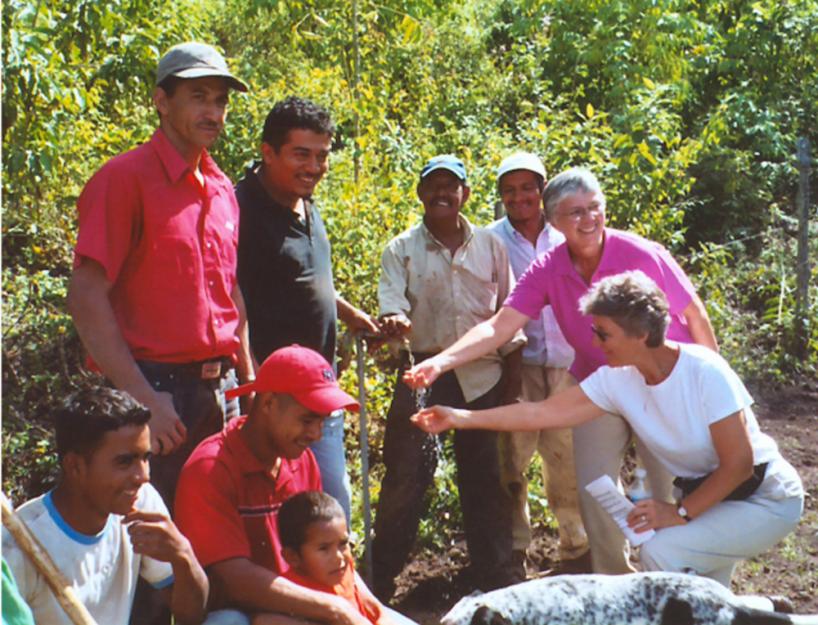
Srs. Rita Goedken, standing, and Judy Sinnwell, both Sisters of St. Francis of Dubuque, Iowa, rejoice with villagers at the site of the first completed Sister Water Project in Honduras in 2007. (Courtesy of the Sisters of St. Francis of Dubuque, Iowa)
Franciscan Sr. Donalda Kehoe — then 91 — attended a bowling fundraiser last year for the project and had so much fun she now bowls once a month to stay in shape.
"Being a spectator or a participant in a fund-raising bowling tournament is a rewarding win-win method of almsgiving," Kehoe wrote in response to questions. "It's an event that promotes camaraderie, bonding, conversation and generosity — a method right down my alley."
Roche, recently retired from doing strategic planning for a health system, got involved a year ago. He had read about the project in the local newspaper and heard about it several times at various community events, so when the project committee — made up of sisters, associates and volunteers — needed help with strategic planning, he volunteered.
"I had read about it," he said. "But it hadn't sunk in — the enormity of the project they had taken on." It sunk in eight months later on a mountainside in Honduras.
"[The Honduran workers] saw us as comical," Roche said. "We were clumsy. We had steel-toed boots, sunscreen, gloves — they were wearing jelly shoes or tennis shoes, no sunscreen, no gloves, and worked three times as hard as any of us."
The local crews are made up of men from the village. Each of three neighborhoods takes turns sending a crew up the mountain for a week to work on the pipeline. The pipeline — this one is 32 kilometers (20 miles) long — is necessary because the ground is too rocky to dig wells and the rivers are either unsuitable to drink from or often dry up. The pipeline will carry water from a spring in the mountains to the villagers below.
"I feel like I need to go there when it's done and drink that water," Roche said.
The Sister Water Project was officially launched in 2006, said Sr. Rita Goedken, who was on the Dubuque Franciscans' leadership team when the project began and was part of the first trip to Honduras. The congregation wanted to meet a real need of the poorest of the poor and for the project to engage not just sisters, but associates, friends and the larger Dubuque community. The project now attracts volunteers from all over the country.
"Safe, potable water became the issue we would focus on," Goedken said. "And we chose two countries where we either had or still have sisters, Tanzania and Honduras."
In November 2007, the project sent its first team abroad — 30 people to the village of Positos, Honduras. Two men from Le Mars, Iowa, who had worked on similar projects before and knew where to get supplies and who to contact, met them there to guide the work, she said.
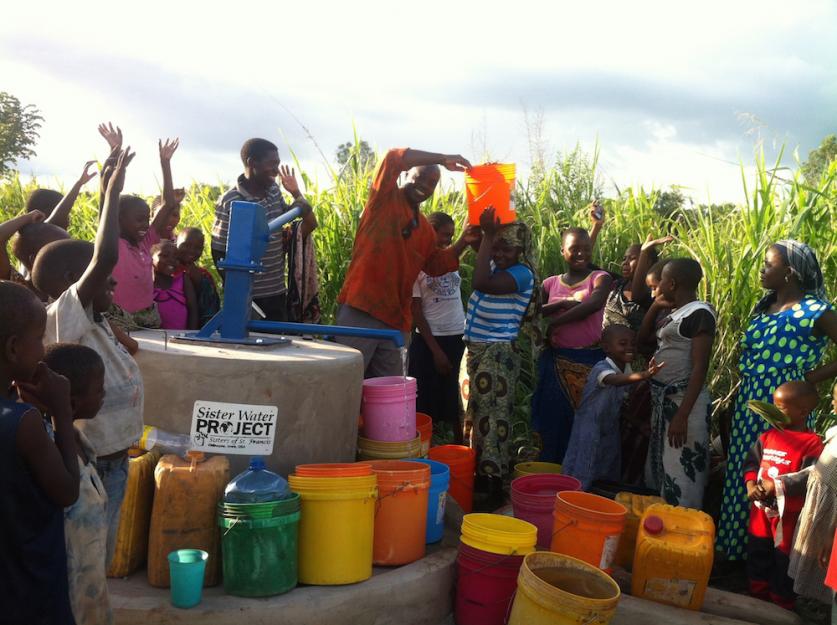
People in Tanzania rejoice at the opening of a well providing fresh, clean drinking water. The well was funded by the Sister Water Project of the Sisters of St. Francis of Dubuque, Iowa, and installed by Safe Water for Life and Dignity. (Courtesy of the Sisters of St. Francis of Dubuque, Iowa)
"By the end of the week, there was a new water tank at the top of the hill and a pump at the bottom, and when water spurted out, people just burst into songs of praise," Goedken said. "They just needed help and supplies and money to do it with."
That project changed the lives of everyone in that village, she said. But it also changed everyone on the team.
"We talked and talked about it later," Goedken said. "The people on the team were just moved by what they saw and heard and experienced."
Sinnwell said the community often talks about a "common heart" — and this project has helped achieve that.
"Something happens in the group, with the shared reflecting as well as just the work," she said. "It's the kind of bridge building we hope happens."
The initial goal of the Sister Water Project was to raise $42,000 to make a single trip to Honduras. But in the first six months, they raised $100,000.
"It was just going to be this one time," Sinnwell said. "It shocked all of us."
Thanks to donors and partners, including the Congregation of the Humility of Mary, Holy Spirit Sisters, Salvatorian Missions, and Dubuque Rotary Club, they have raised more than $1 million. They have completed 20 projects in Honduras and completed or restored more than 200 wells in Tanzania.
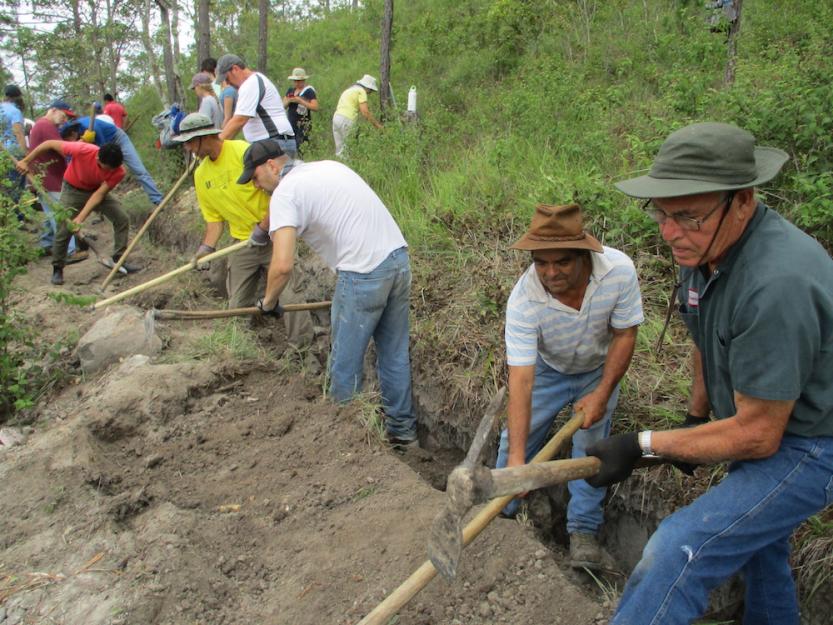
Sister Water Project volunteers install pipes to complete a 19-mile water project in the Honduran village of Mejocote, August 2018. (Courtesy of the Sisters of St. Francis of Dubuque, Iowa)
"The appreciation I now have – and it hasn't diminished since I've been back — about water, and even about water issues in my own community, has changed," Roche said. "It's something I've been trying not to take for granted."
Sinnwell said that's a common reaction.
"It changes how I read the paper, what I choose to read in the paper and how I watch the news," she said.
In Tanzania, the project partnered with the Society of the Divine Savior — known as the Salvatorians — in Milwaukee, who already had a channel developed to get money to Tanzania. The money allows a Tanzanian organization, Safe Water for Life and Dignity, to install or repair wells. Project committee members have been to Tanzania to see the work, Goedken said, but work teams are not needed.
Without a proper well, villages rely on women and girls hauling unsafe water from a river or they take water from an open pit, ripe for contamination.
Committee member Brian Gilligan speaks in a Sister Water Project video about visiting Tanzania and seeing a little girl carrying water for her family. On a return trip two years later, she was wearing school clothes — the well freed her from the chore and allowed her to attend school for the first time, changing her life in a second way.
Now, as the congregation prepares for its next chapter meeting, the committee is doing strategic planning for the future — which is how Roche got involved.
"Now we have to face, what do we do for the future," Sinnwell said. "Is this sustainable, what kind of structures do we leave in place? We've realized we also need to educate the community so that our sisters and associates can make the best decisions."
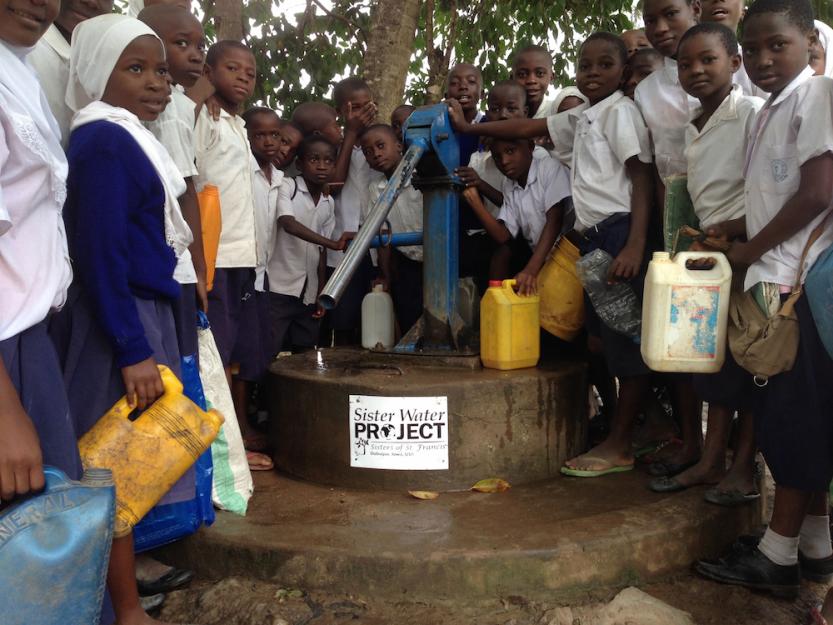
Well in Tanzania (Courtesy of the Sisters of St. Francis of Dubuque, Iowa)
Well in Tanzania (Courtesy of the Sisters of St. Francis of Dubuque, Iowa)
Alone or with a partner, consider these questions:
- How does water scarcity affect people around the world? Include both statistics and observations shared in the article.
- Describe ways that people are helping to solve situations of water scarcity, including both direct participation in sisters' projects and behind-the-scenes efforts to support these.
- Why do you think that helping people acquire clean water changes the lives of those who do the helping?
A woman once came to a well for water and walked away as a changed person.
Jesus, tired from his journey, sat down there at the well. It was about noon. A woman of Samaria came to draw water. Jesus said to her, "Give me a drink." His disciples had gone into the town to buy food. The Samaritan woman said to him, "How can you, a Jew, ask me, a Samaritan woman, for a drink?" (For Jews use nothing in common with Samaritans.) Jesus answered and said to her, "If you knew the gift of God and who is saying to you, 'Give me a drink,' you would have asked him and he would have given you living water." [The woman] said to him, "Sir, you do not even have a bucket and the well is deep; where then can you get this living water? Are you greater than our father Jacob, who gave us this well and drank from it himself with his children and his flocks?" Jesus answered and said to her, "Everyone who drinks this water will be thirsty again; but whoever drinks the water I shall give will never thirst; the water I shall give will become in him a spring of water welling up to eternal life." The woman said to him, "Sir, give me this water, so that I may not be thirsty or have to keep coming here to draw water."
John 4:6-15. Click here to read more about their encounter in John 4:1-42.
- What did the woman discover through her encounter with a stranger at the well?
- What did Art Roche and his fellow volunteers learn as they tried to help the Honduran people? What lessons did you learn from their encounter?
Pope Francis discusses about how unsafe drinking water hurts people living in poverty in "Laudato Si’," his 2015 encyclical on the environment. He writes:
"[A]ccess to safe drinkable water is a basic and universal human right, since it is essential to human survival and, as such, is a condition for the exercise of other human rights. Our world has a grave social debt towards the poor who lack access to drinking water, because they are denied the right to a life consistent with their inalienable dignity."
"Laudato Si’: On Care for Our Common Home," [30]
- Everybody needs water, not simply to survive but to live productive, dignified lives. How is a lack of water harmful to people beyond those who are thirsty?
- Is it our fault that someone we’ve never seen or met is sick or dying because they lack clean drinking water? Why or why not? What do you owe a person in that situation?
Explore more about the Sister Water Project and Water With Blessings and discover ways you can become involved with these ministries. Discuss with your class, teachers and school leaders whether you can host a fund-raising event, invite a speaker or support these efforts in other ways.
The H2O Project is a simple way to live in solidarity with people who lack access to safe drinking water. The concept is simple: Drink nothing but water for two weeks, then donate the money you've saved (by not buying soft drinks, sports drinks, coffee and other beverages) to an organization such as Sister Water Project of Water With Blessings that works to provide clean drinking water to people in developing countries.
Praised be you, my Lord, through Sister Water,
who is very useful and humble and precious and chaste.
Let us praise you and please you, loving God, by appreciating how precious and useful our water truly is.
Help us strive to keep the water you bless us with pure and to be mindful not to waste even a drop.
And help us to share this gift with our neighbors who thirst for it around the world. Let us be refreshed and renewed, not only by water, but by the gifts we share in our encounters with others.
Amen.
Tell us what you think about this resource, or give us ideas for other resources you'd like to see, by contacting us at education@globalsistersreport.org
